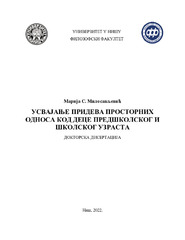Приказ основних података о дисертацији
Usvajanje prideva prostornih odnosa kod dece predškolskog i školskog uzrasta
| dc.contributor.advisor | Ilić, Mirjana K. | |
| dc.contributor.other | Janjić, Marina | |
| dc.contributor.other | Ratković, Dragana | |
| dc.creator | Milosavljević, Marija S. | |
| dc.date.accessioned | 2023-03-28T21:13:43Z | |
| dc.date.available | 2023-03-28T21:13:43Z | |
| dc.date.issued | 2022 | |
| dc.identifier.uri | http://eteze.ni.ac.rs/application/showtheses?thesesId=8580 | |
| dc.identifier.uri | https://fedorani.ni.ac.rs/fedora/get/o:1855/bdef:Content/download | |
| dc.identifier.uri | https://plus.cobiss.net/cobiss/sr/sr/bib/78700297 | |
| dc.identifier.uri | https://nardus.mpn.gov.rs/handle/123456789/21337 | |
| dc.description.abstract | The subject of this doctoral dissertation is the acquisition of spatial adjectives in the domain of physical space and abstract domain, as well as the acquisition of meaning of adjective antonym pairs in children of various ages. As children are older, and therefore linguistically and cognitively more developed, it could be expected the increase in a number of the total number of various adjectives that child uses. The acquisition of linguistic expressions for spatial coding is conditioned by the development of general cognitive abilities. The process of acquisition of abstract meaning of dimensional adjectives and meaning of opposites of these adjectives, as well as the speed at which these meanings are acquired, is presented through various development stages. We rely on Piaget's theory of cognitive development of language abilities which is based on empirically established facts. The applied method is the method of verbal associations by using the test of controlled and free word associations. The research was conducted on the child population of six and eight years of age. The results show that in the younger age most meanings were related to concrete physical space whereas in older ages abstract meanings were more often presented. Paradigmatic answers are present in larger numbers in an older age compared to a younger age which indicates a higher level of their language development. Children of an older age acquired more antonyms of spatial adjectives in relation to the children of a younger age. Better test results in all tests were achieved by children from the urban environment in comparison to children from rural environments. There is no difference between boys and girls when it comes to the adoption and understanding of the meaning of spatial adjectives. | en |
| dc.format | application/pdf | |
| dc.language | sr | |
| dc.publisher | Универзитет у Нишу, Филозофски факултет | sr |
| dc.rights | openAccess | en |
| dc.rights.uri | https://creativecommons.org/licenses/by-nc-nd/4.0/ | |
| dc.source | Универзитет у Нишу | sr |
| dc.subject | Prostor | sr |
| dc.subject | Space | en |
| dc.subject | adjectives | en |
| dc.subject | language acquisition | en |
| dc.subject | verbal associations | en |
| dc.subject | spatial and abstract meaning | en |
| dc.subject | paradigmatic and syntagmatic relations | en |
| dc.subject | antonyms | en |
| dc.subject | cognitive development | en |
| dc.subject | development stages | en |
| dc.subject | pridevi | sr |
| dc.subject | usvajanje jezika | sr |
| dc.subject | verbalne asocijacije | sr |
| dc.subject | prostorno i apstraktno značenje | sr |
| dc.subject | paradigmatski i sintagmatski odnosi | sr |
| dc.subject | antonimi | sr |
| dc.subject | kognitivni razvoj | sr |
| dc.subject | stadijumi razvoja | sr |
| dc.title | Usvajanje prideva prostornih odnosa kod dece predškolskog i školskog uzrasta | sr |
| dc.type | doctoralThesis | |
| dc.rights.license | BY-NC-ND | |
| dc.identifier.fulltext | http://nardus.mpn.gov.rs/bitstream/id/150384/Milosavljevic_Marija_S.pdf | |
| dc.identifier.fulltext | http://nardus.mpn.gov.rs/bitstream/id/150383/Doctoral_thesis_13418.pdf | |
| dc.identifier.rcub | https://hdl.handle.net/21.15107/rcub_nardus_21337 |



